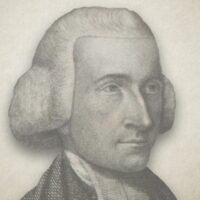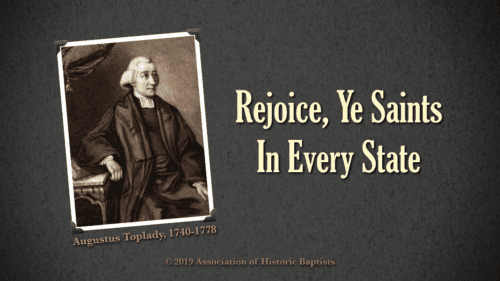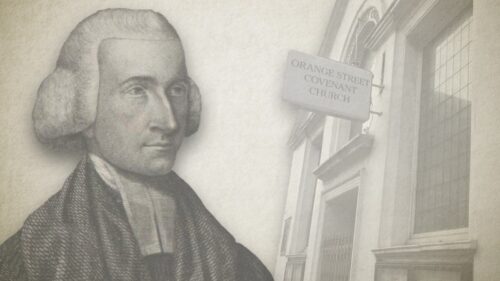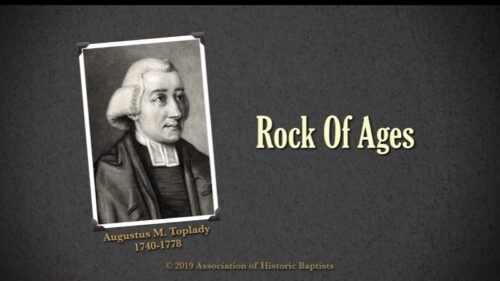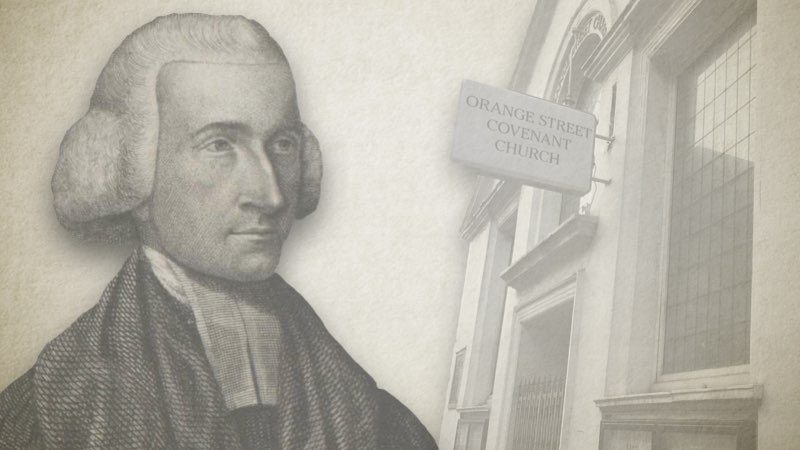
The Life And Character Of Augustus Toplady
Gospel Magazine 1840:
A Sketch Of The Character And Life Of The Rev. Augustus Montague Toplady, B. A., Late Vicar Of Broad Hambury, Devon.
In commencing a new scries of this Periodical, which has now had an existence of about seventy years duration, we judged that it would be an acceptable introduction to its general Readers and Friends, interested in the promulgation of Divine truth, to give a portrait and sketch of the life and character of one of its first Editors, the illustrious and learned Toplady. He was the boldest and most successful advocate and defender of the Church of England she ever possessed, from the vile slanders and jesuitical insinuations of the Wesleyan dissenters. He made a grand exhibition of Divine truth on the platform of Church of England orthodoxy, which all the Pelagian sophistry in the world cannot conceal from the enlightened eye. He evinced that the doctrines of our venerable Reformers were not only adverse to the religious faction which he opposed, but also strictly consonant with the veracity of Jehovah, as developed in Divine Revelation. He clearly demonstrated that the established formularies of Christ’s Church in England embraced the whole circle of apostolical truth, as commonly denominated the “Doctrines of .Grace;” and also, with equal demonstration, he established the unscriptural basis and licentious tendency of Wesleyan Pelagianism. He was a learned, devout, eloquent, and devoted clergyman of Christ’s Apostolical Church in these realms. His preaching was of a superior cast—argumentative, convincing, sublime, and most spiritual. Whenever he occupied the metropolitan pulpits, the multitude who flocked to hear was so dense, that the churches could not accommodate the half of them. In his Christian character, he was of a bold and independent spirit. There was an apostolical honesty and dignity in his soul which elevated him above any artifice, and made him superior to any unbecoming mode of behaviour. When he beheld popular men, professing an extraordinary attachment to Christianity and the Church of England, opposing the doctrines they had subscribed, his sanctified spirit took fire, and with open rebuke and scriptural argument he treated them as opposers of Divine Revelation. In fact, his punctual regard for truth distinguished him in every relation, whether public or private. The principles of sound Christianity were established in him; and as they were not merely notional or speculative, but radical and experimental, they gave a lively colour and refreshing fragrancy to all his actions and expressions, which rendered his society delightful. In St. Paul we observe all the zeal and humility of a missionary, joined to the most polished manners. This was the case with Mr. Toplady, who displayed all the honest zeal of a Christian upon conviction, was constant in season and out of season, and would have suffered martyrdom rather than to have yielded a single particle of truth, either through fear or favour. But with all this, his manners were those of the most finished gentleman, which rendered him acceptable, as such, in all companies. His talents were of the first order; and it is to be lamented that his abilities and learning did not meet with a more equal opponent than John Wesley, whose want of knowledge and religion led him into conduct most reprehensible and unchristian, and for which he received nothing but justly-merited chastisement from Mr. Toplady. And of his followers it may still be asserted, that they are the widest dissenters from the Church of England, both in discipline and doctrine, amongst the numerous sectaries of this sectarian age.
Augustus Montague Toplady was born at Farnham, in Surrey, on the 4th of November 1740, and was baptized by the name of Augustus Montague, out of respect to two gentlemen who stood as his sponsors, receiving the Christian name of the one, and the surname of the other. His father was a Mr. Richard Toplady, who was a major in the army, and died at the siege of Carthagena, soon after the birth of his son.
His mother’s maiden name was Catherine Bate, member of a respect able family residing in the vicinity of London. Two of her brothers were ministers in the Church of England. One of them held the rectory of St. Paul’s, Deptford, and by him her marriage was solemnized, in his own church.
Mr. Toplady was sent, at a very early period of his life, to Westminster School, where he made great proficiency, discovering from the first a vigorous intellect, and by an uncommon application to study he attained a knowledge of languages which raised him above his compeers. His mother, having some title to an estate in Ireland, found it necessary, in the prosecution of her claims, to remove into that kingdom. Thither she was accompanied by her son, who was shortly after admitted a student in Trinity College, Dublin, at which University he received academical honours, and took his degree of Bachelor of Arts. About the sixteenth year of his age he was converted to the faith of the Gospel. After much patient investigation of the Word of God, and the best theological Divines, especially the English Reformers, he was prepared for entering into the Christian ministry, and was accordingly ordained Deacon on Trinity Sunday, the 6th of June 1762. Having subscribed the doctrines of the Church of England, ex animo, he was prepared to preach them with a zeal and earnestness corresponding to his firm conviction of their intrinsic truth and eternal importance.
In the year 1768 he became vicar of Broad Hembury, near Honiton, in Devonshire. Here he lived on a small income of not more than £80 per annum. In this situation also he composed the greatest part of his writings. In the beginning of the year 1774, a religious pamphlet was printed, called the Gospel Magazine, of which Mr. Toplady became the editor, whereby its sale was increased considerably. At length, Mr. Toplady’s health and strength being impaired, he was advised to remove to London, which took place in the year 1775. His friends obtained for him the French Reformed Church in Orange-street, where he continued to preach Christ till 1778, when he was caught up into glory on the 11th of August in the same year, in the thirty-eighth year of his age, and buried on the 17th of the same month, in Tottenham Court Chapel. His writings are contained in six octavo volumes, with manuscripts enough to form a seventh. They are most invaluable treasures to private Christians, and especially to clergymen, as containing the sound doctrinal views of the Church of England, and of our Reformers. The author of this imperfect sketch prays that Mr. Toplady’s writings, when perused, may be attended with the Divine blessing, and prove the means of enlightening the erroneous, and of cheering and comforting the elect people of God.
Augustus Toplady (1740-1778) was an English preacher, theologian and hymn writer, belonging to the Church of England. He staunchly opposed Arminianism, nurtured high views of sovereign grace, and was one of the leading figures who stood against the humanism and sophistry of John Wesley. He is best known for the hymn, “Rock of Ages”, but was also a prolific writer whose works are published in six volumes. John Gadsby wrote of him:
“Augustus Montagu Toplady was born at Farnham, Surrey, Nov. 4th, 1740. Toplady lived in a day when Arminianism vigorously reared its head in the Protestant Church, when the Arminians broached the heresies that "every believer, till he comes to glory, works for as well as from life," that "nothing can be more false than that a man is to do nothing in order to justification," that election is a "horrible decree," &c; and Toplady vigorously combated those doctrines. About that time the Calvinistic and Arminian (or Wesleyan) Methodists were divided. When Huntington was raised up, he found that, in the Calvinistic churches, all who professed the doctrines of grace were reputed to be Christians, especially if they could talk largely of election, predestination, &c; and he was "set," as God's mouth, to draw the line between possession and a mere profession,—to separate the chaff from the wheat. The ministry of each was peculiarly adapted to the times in which he lived; and this has been the case with the Lord's more highly-favored ministers in all ages. I might instance the great Reformers, Calvin, Luther, Zwingle, Waldo, Wickliffe,&c. Each did the work appointed for him, and each was as indispensable in his day as the harrow is after the plough. (See Lady Huntingdon, Whitefield, &c.) But I am rambling from my memoir. Toplady's father was a major, and died at the siege of Carthagena soon after Toplady was born. Toplady received his early education at the Westminster School, and thence went with his mother to Ireland. When about the age of 10, it pleased God in his providence to direct his steps into a barn, at a place called Codymain, where a layman was preaching. The word was fixed on his conscience. Reflecting upon the circumstance a few years afterwards, he says, "February 29th, 1768, at night, after my return from Exeter, my desires were strongly drawn out, and drawn up to God. I could, indeed, say that I groaned with the groans of love, joy, and peace; but so it was, even with comfortable groans that cannot be uttered. That sweet text, 'Ye, who were sometimes afar off, are made nigh by the blood of Christ,' (Eph. 2:13,) was particularly delightful and refreshing to my soul; and the more so as it reminded me of the days and months that are past, even the day of my sensible espousals to the Bridegroom of the elect. It was from that passage that Mr. Morris preached on the memorable evening of my effectual call by the grace of God, under the ministry of that dear messenger; and under that sermon I was, I trust, brought nigh by the blood of Christ, in August, 1756. Strange that I, who had so long sat under the means of grace in England, should be brought nigh unto God in an obscure part of Ireland, amidst a handful of God's people met together in a barn, and under the ministry of one who could hardly spell his name! Surely it was the Lord's doing, and is marvellous! The excellency of such power must be of God, and cannot be of man. The regenerating Spirit breathes not only on whom, but likewise when, where, and as he listeth."—In June, 1762, Toplady "received the imposition of hands," and subscribed to the Articles, &c, of the Church of England five times. He "did not believe them,” he said, "because he subscribed to them, but he subscribed to them because he believed them." He considered them, indeed, as almost, if not quite, immaculate. In one of his works he remarks, that if the apostles had lived in that day, he believed they would all have been members of the Church of England! So great is the infatuation with which even good men may be left to be carried away. Shortly after he entered the ministry, he was inducted into the living of Blagdon, Somersetshire, but subsequently resigned it, as he learnt that it had been purchased for him. He first possessed the living of New Ottery, which he exchanged in 1708 for that of Broad Hembury, near Honiton, Devonshire, which he held until his death. Through the lenity exercised towards his parishioners, the whole living did not amount to £80 a year. Though Toplady was so staunch an advocate for the Church of England, he was nevertheless courteous and kind to all who differed from him in opinion, so long, as he said to Dr. Priestley, as they were transparent. "Give me," said he, "the person whom I can hold up as I can a piece of crystal, and see through him. I revere and admire real probity wherever I see it; but artifice, duplicity, and disguise I cannot away with." Dr. Gill, the Baptist, he highly esteemed, as he did also many other Dissenters. With John Wesley he was uncommonly severe, not because he had in great measure swerved from the Establishment, and set up as a "head" on his own account, but because he said disingenuousness, disguise, dishonesty, marked many of his goings. Many things were, however, I believe, attributed to Mr. W., of which he knew no more than did Toplady himself, his followers being mainly to blame. But all these things are as well passed by. "But let it not be supposed," he says, "that I bear them (Wesley and his supporters) the least degree of personal hatred. God forbid! I have not so learned Christ. The very men who have my opposition have my prayers also. I dare address the great Shepherd, and say,
“Hast thou a lamb in all thy flock
I would disdain to feed?”
But I likewise wish to add,
“Hast thou a foe, before whose face
I fear thy cause to plead?”
A more sincere and honest man than Toplady was has not, perhaps, existed for 18 centuries. He had the courage of a lion, but his frame was brittle as glass. Excessive study, united with the damp air of Devonshire, was the means of greatly impairing his health, laying the foundation of a consumption, which terminated in his death. He endeavored to change his living for one in a drier part of the island, but could not succeed. His medical advisers, however, recommended him to remove to London, which he did in 1775, when he became more intimately connected with the Countess of Huntingdon and the Calvinistic Methodists.
His friends engaged for him, for Sunday and Wednesday evenings, the French Calvinist Reform Church in Orange Street. His first sermon there was preached on Lord's Day, April 11th, 1770. Three months afterwards he published his selection of hymns, a copy cf which, after much effort, I have procured for the British Museum. There are plenty of copies of a later edition, but it is spurious. In this collection are some hymns of his own, some of Charles Wesley's, some extracted from the "Gospel Magazine," and some from other quarters. As with all other collections published about that period, such as Madan's, Wesley's, Aldridge's, Coughlan's, Lady Huntingdon's, &c. the names of the authors were not attached to the respective hymns. This is to be regretted, as, had it been otherwise, it would have saved a great deal of contention. On publishing his works, after his death, Mr. Row inserted many hymns, and called them Toplady's, which were not his, but which were Charles Wesley's, &c. Taking advantage of this circumstance, many persons, who are ignorant of the facts, have charged Toplady with theft, &c.; whereas Toplady had no more idea that such hymns would be ascribed to him than that one of his hymns, (“Rock of Ages,") inserted in the Wesleyan Selection, would be ascribed to Wesley…
Toplady united, in a very high degree, those various excellences which make a captivating preacher. Dignified and serious, yet singularly pleasing in his appearance, having a melodious voice and a graceful action, with a keen eye, an ardent spirit, and a peculiar talent for fluent and felicitous expression, he could readily gain the attention of any audience. Nor did he fail to impress the hearts of many, "whose tears were often seen to flow along with his own. Yet, after all, it was not the manner, but the matter, which formed the grand charm of his pulpit oratory…
I shall here introduce a few extracts from a narrative published a short time after his death. Some of his observations were, by a few persons who were present, committed to writing at the time. He frequently disclaimed, with abhorrence, the least dependence on his own righteousness as any cause of his justification before God, and said that he rejoiced only in the free, complete, and everlasting salvation of God's elect by Jesus Christ, through the sanctification of the Holy Spirit. A remarkable jealousy was apparent in his whole conduct, for fear of receiving any part of that honor which is due to Christ alone. He desired to be nothing, that Jesus might be all and in all. His feelings were so very tender upon this subject, that a friend once undesignedly put him in an agony, by remarking the great loss which the church of Christ would sustain by his death, at this particular juncture. The utmost distress was immediately visible in his countenance, and he exclaimed to this purpose: "What! by my death? No! by my death? No! Jesus Christ is able, and will, by proper instruments, defend his own truths. And with regard to what little I have been enabled to do in this way, not to me, not to me, but to his own name, and to that only, be the glory."
"A short time before his death," says a friend, "at his request, I felt his pulse; and he desired to know what I thought of it. I told him, that his heart and arteries evidently beat weaker and weaker. He replied immediately, with the sweetest smile upon his countenance, 'Why, that is a good sign, that my death is fast approaching; and, blessed be God, I can add, that my heart beats every day stronger and stronger for glory.’”
…On Tuesday, Aug. 11th, 1778, his spirit departed. He was interred in Tottenham Court Chapel. His body had not been long in the earth before Mr. Wesley publicly asserted that he died blaspheming, and in the horrors of despair, and that none of his friends were permitted to see him; and one of the Wesleyan preachers, named Rhodes, asserted that his (Toplady's) case was like the awful one of Francis Spira, and added that “the dreadful manner in which he died had caused a woman who attended him to join the Wesleyan Society." Sir Richard Hill wrote two letters in the "General Advertiser" to Mr. Wesley, calling upon him either to retract the statements or deny having made them. I deeply regret that my limits will not allow me to publish them here, as they were written with ability and to the purpose. A declaration was signed by thirteen persons, who had from time to time been with Mr. Toplady in his last hours, expressing their readiness to testify upon oath, if required, the falsity of Mr. Wesley's statements. Among the names I find that of the woman whom Mr. Rhodes said had joined the Wesleyan Society, and also those of Dr. Andrew Gifford and John Ryland, Sen., and Thomas Evans and Thomas Hough, Mr. Toplady's medical attendants. Well, indeed, might Toplady say of any one who could so act, "Tenderness has no good effect upon him and his pretended family of love. I shall never attempt to hew such millstones with a feather. They must he pressed close like nettles, and then they cannot sting."



